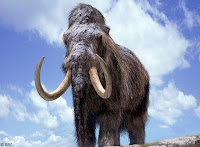
During my application for the MA in Palaeolithic Archaeology I've been thinking about one very important question: why do you want to study human origins? And despite having somehow thrown together a professional sounding response to the question, it's something I can't really answer. Not because I don't know, but because I can't really explain why it fascinates me so much.
When I was asked by a colleague about my choice in courses, my first response was "well... why wouldn't you"? Why would someone not want to understand who we are, what we are, and how we got here? I understand not everyone wants to go as far as studying it in such depth, but I really didn't believe I was being asked! I always assumed it was just human nature to want to explore our world and our history, so I can't really comprehend people who are happy to just continue with their lives blissfully unaware that there is more to life than what's coming up next on ITV.
Although anything in prehistory suits me, I'm particularly fascinated by very early humans. Put simply, the sort of advanced monkeys through to the early humans/Homo family. That's the sort of time in human evolution where the body and the mind are evolving at an incredible rate, and with the advancement of the brain comes advanced behaviour. (Note: My enthusiasm dips slightly for P./A. boisei. His pointy head is a tad creepy.) For example, the tradition of leaving flowers at a grave or memorial. We've always done it, we all do it, but have you ever thought about why? At what point did people think it would be a good idea to leave things, other than personal possessions, at a grave? And come to think of it, when and why did someone suddenly think it was a good idea to start burying them? This is the sort of thing I'm interested in, and those are the questions I want to answer.
And I don't want to do some digging, I want to help people understand their history too. Some museums can be so plain and boring, I want to be able to help people look into the past and see it as if they're looking through the eyes of an ancient hominid. I've had some fantastic lecturers, and one in particular made me feel like I was looking through the eyes of a caveman onto his cave wall as he did his cave paintings. (Note: Or her!)
So, back to the question.... why human origins? Honestly, I couldn't tell you. There's something so enticing about it, and I just can't put it into words. Like a moth to a flame, like a magpie to a shiny Kit Kat wrapper... I can't help myself. I'm not really sure if it's a good thing or a bad thing, but perhaps once I've completed my Masters I'll be able to put it more eloquently.
(Disclaimer: To all of the real archaeologists.... Despite appearances, I do actually know what I'm talking about, I'm just trying to keep it simple. I haven't just been watching too much Time Team. Regards, Sarah.)
